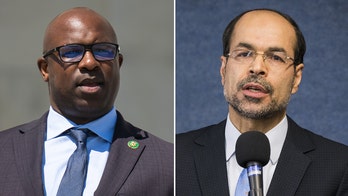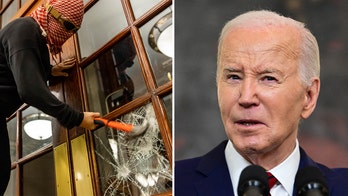Florida Republican Sen. Marco Rubio dismissed arguments Sunday that the Senate immigration bill offers amnesty for illegal immigrants and said border security is not the only key issue -- amid scrutiny from some fellow conservatives and the union that represents immigration enforcement agents.
Rubio told “Fox News Sunday” that anybody living illegally in the United States and attempting to get a visa would face a long list of qualifications, which includes paying taxes, a fine and an application fee as well as having a job and waiting for at least 10 years.
“That is not amnesty,” said Rubio, a Cuban-American considered a key member of the so-called bipartisan Gang of Eight. “Amnesty is the forgiveness of something.”
The Senate group has been working on comprehensive immigration reform since January and is expected to release the legislation Tuesday, ahead of a hearing later this week in the Senate Judiciary Committee.
Rubio also argued Sunday that achieving citizenship through the new plan would be harder than under the existing plan.
“It will be cheaper, faster and easier for people to go back home and wait 10 years than it will be to go through this process that I've outlined,” Rubio told Fox.
The Rubio-backed plan faces increasing scrutiny from such fellow Republican senators as Ted Cruz, of Texas, and Alabama's Jeff Sessions, as well as the National ICE Council, the union representing thousands of U.S. Immigration and Customs Enforcement employees.
“I know Sen. Rubio's heart is exactly right," Sessions told ABC’s “This Week.” "And I really respect the work of the Gang of Eight. But they have produced legislation ... that will give amnesty now, legalize everyone that's here effectively today. And then there's a promise of enforcement in the future."
Union President Chris Crane said Friday an outline of the legislation shows legalization before border enforcement, which means Rubio has not followed through on his “commitment to the American people” and that he should leave the bipartisan group.
Rubio also said Sunday that tracking illegal immigrants in and out of the U.S. and improving the employee-verification system, known as E-Verify, are equally important.
“All three work together,” he told Fox. “All three have to happen.”
Though Rubio made clear that securing the border is only part of the plan, he said a 90 percent border-apprehension rate within the next five years is a “trigger” for permanent residence.
“The Department of Homeland Security will have five years to meet that goal,” said Rubio, who appeared on all five major Sunday talk shows to garner support for the legislation.
He was also booked on the Spanish-language networks Telemundo and Univision
If the agency fails to meet apprehension and surveillance goals, a commission, which includes officials from states along the U.S.-Mexico border, would intervene.
There are roughly 11 million illegal immigrants now living in the U.S.
The proposal is available only for those who arrived in the U.S. before Dec. 31, 2011. Anyone who came after that date would be subject to deportation.
As a potential 2016 Republican presidential candidate, Rubio will be careful not to appear weak on border security or create political problems among the conservatives who have great sway in picking the party nominee.
Other lawmakers helping to write the legislation acknowledged the political challenges of the issue.
"A lot of my conservative colleagues have significant questions, and they're legitimate," Sen. John McCain, R-Ariz, said on CNN's "State of the Union." "This is the start of a process.”
Sessions and others are also concerned about the legislation’s long-term impact on taxpayers once illegal immigrants become eligible for major entitlements and low-income assistance programs.
“Please list all federal benefits and aid programs former illegal immigrants become eligible for once granted green cards or permanent residency,” Sessions, along with fellow Republican Sens. Pat Roberts and Chuck Grassley, said in an April 10 letter to the eight senators.
The measure to put millions on a path to citizenship also would allow tens of thousands of new high- and low-skilled workers into the country with new visa programs.
The legislation also is expected to include a new emphasis on merit-based immigration over family ties.
"This is a very balanced bill," New York Democratic Sen. Chuck Schumer told ABC. “The American people have told us to do two things: one, prevent future flows of illegal immigration. Then come up with a common-sense solution for legal immigration. And that's what our bill does."
The Associated Press contributed to this report.





